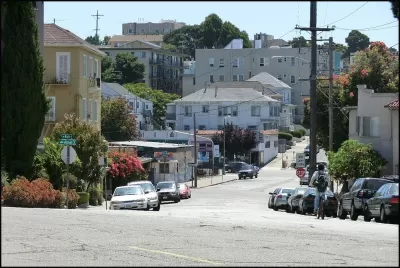If Gov. Gavin Newsom signs the Housing Crisis Act of 2019 as expected, downzonings, density reductions, housing construction moratoriums, and housing caps will become illegal.

"Senate Bill 330, which received scant news coverage, would ban population and housing caps in 'urban clusters,' ban housing construction moratoriums, forbid density reductions and allow demolition of affordable and rent-controlled housing only if the demolished units are replaced," reports Jeff Collins for The Orange County Register.
The bill won final passage Friday, Sept. 6, with business backing but over the objections of the League of California Cities and 56 cities and counties. Newsom has indicated he would sign the measure.
The margins in both chambers were overwhelming considering the depth of opposition from cities, counties, and local groups, rather reminiscent of the successful battles these entities waged against the high profile 'by-right' housing bills, SB 827 and SB 50, authored by Sen. Scott Wiener (D-San Francisco) last year and this year, respectively. The Senate voted 30-4-6 and the Assembly, 67-8-4, or by 75% and 84%, respectively. Collins notes that none of the bill's numerous opponents spoke at the last hearing on Sept. 6.
It also blocks local governments from changing the rules on pending developments by hiking fees or changing permit requirements once a project applicant has submitted preliminary development plans, a statement by state Sen. Nancy Skinner, D-Berkeley, said.
Two of the League's three objections [pdf] concerned the fee restrictions included in the bill: freezing certain fees and prohibiting the imposition of most types of additional fees. These provisions end when the bill sunsets on January 1, 2025.
In addition to business groups, the bill had the support of numerous nonprofit housing groups and developers and two prominent environment organizations, the Natural Resources Defense Council and the Planning and Conservation League.
Housing planned ≠ housing built
According to Skinner's office, "SB 330 is based on the premise that much of the housing we need has already been planned for by local communities. According to a 2019 report by UCLA Lewis Center for Regional Policy Studies ["A Flawed Law: Reforming California’s Housing Element"], California cities and counties have approved zoning for 2.8 million new housing units."
But that housing is not getting built. In fact, the number of residential building permits in the first six months of this year plummeted nearly 20% compared with the same period in 2018.
According to the 09/05/19- Senate Floor Analyses, "SB 330 is a targeted approach that prohibits the most egregious practices in the areas where housing is most needed. It prevents local governments from downzoning unless they upzone elsewhere, and it stops them from changing the rules on builders who are in the midst of going through the approval process."
Skinner is also the author of the Senate Bill 167: Housing Accountability Act of 2017, aka anti-NIMBY law as it empowers renters group to sue cities that deny new construction.
Hat tip to Matthew Lewis.
Related in Planetizen:
-
Proposed Law Would Prevent Downzonings in California, March 4, 2019
- Eight posts tagged "Housing Accountability Act"
FULL STORY: Bill to boost California homebuilding headed to Newsom’s desk

Planetizen Federal Action Tracker
A weekly monitor of how Trump’s orders and actions are impacting planners and planning in America.

Maui's Vacation Rental Debate Turns Ugly
Verbal attacks, misinformation campaigns and fistfights plague a high-stakes debate to convert thousands of vacation rentals into long-term housing.

Restaurant Patios Were a Pandemic Win — Why Were They so Hard to Keep?
Social distancing requirements and changes in travel patterns prompted cities to pilot new uses for street and sidewalk space. Then it got complicated.

In California Battle of Housing vs. Environment, Housing Just Won
A new state law significantly limits the power of CEQA, an environmental review law that served as a powerful tool for blocking new development.

Boulder Eliminates Parking Minimums Citywide
Officials estimate the cost of building a single underground parking space at up to $100,000.

Orange County, Florida Adopts Largest US “Sprawl Repair” Code
The ‘Orange Code’ seeks to rectify decades of sprawl-inducing, car-oriented development.
Urban Design for Planners 1: Software Tools
This six-course series explores essential urban design concepts using open source software and equips planners with the tools they need to participate fully in the urban design process.
Planning for Universal Design
Learn the tools for implementing Universal Design in planning regulations.
Heyer Gruel & Associates PA
JM Goldson LLC
Custer County Colorado
City of Camden Redevelopment Agency
City of Astoria
Transportation Research & Education Center (TREC) at Portland State University
Jefferson Parish Government
Camden Redevelopment Agency
City of Claremont





























